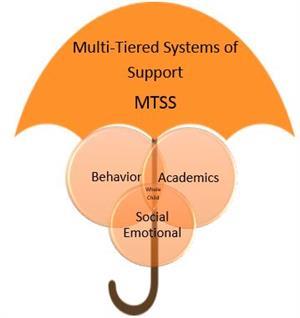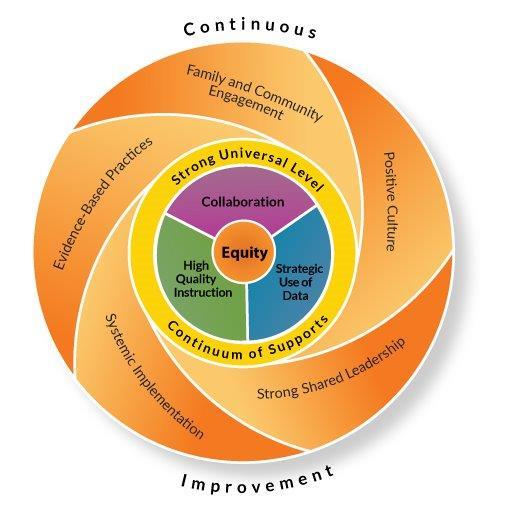- School District of Marshfield
- Multi-Tiered System of Supports (MTSS)
Teaching & Learning
Page Navigation
Parent Resource
MTSS
-
The School District of Marshfield is committed to working collaboratively to improve student learning. To ensure the success of all students, the School District of Marshfield implements a multi-tiered system of supports (MTSS) model.
Vision Statement
The Unified School District of Marshfield’s vision for the implementation of a MTSS framework, embedded in best practice, is to ensure that ALL students in the district are provided with high quality instruction that is evidence based within a supportive environment, ensuring that students’ academic and behavior needs are not only met, but promote growth within the learning environment.
MTSS Framework
MTSS is a systemic, continuous- improvement framework that uses evidence-based practices, focusing on data-based problem-solving at multiple levels to support “need-driven” decision making to accelerate performance for all students. It is based upon the assumption that all students can learn and achieve when provided with effective teaching, research-based instruction and access to standards-based curriculum.

MTSS is often compared to an umbrella, which includes a variety of supports in the areas of behavior, academics and social/emotional learning to support the whole child. The MTSS framework is considered a preventative framework, allowing students to access a variety supports when needed.
The Wisconsin Department of Public Instruction's guide for equitable MTSS includes a core focus on equity, which is supported by collaboration, strategic use of data and high quality instruction. The guiding document defines these components as the following:

Image Credit: Wisconsin Department of Public Instruction
- Equity is at the center of the framework and embedded into all other key system features to challenge and change inequitable access, opportunity, and outcomes experienced by learners currently underserved in Wisconsin schools.
- Collaboration among staff, learners, families and communities to make the complex work of system change possible.
- High quality instruction is defined as engaging, standards-based, data-driven, and research-based instruction which is grounded in culturally responsive practices.
- Strategic use of data indicates that no single test should determine a student’s experience at any phase of a MTSS system, rather multiple types of data should be gathered and their evidence should be considered for continuous improvement.
Within the framework, educators, families and communities collaborate together toward common goals. The guiding document notes that “these elements do not work in isolation. Rather, all components of the visual model inform and are impacted by the others; this relationship forms Wisconsin’s vision for equitable Multi-Tiered Systems of Support.”
Implementation
Academic:
The Unified School District of Marshfield uses a variety of data to determine if a student needs additional academic support. If a student is identified as needing additional support, an evidenced-based intervention is implemented for about nine weeks and the student's progress is monitored using a very brief assessment weekly. A school-based team then decides if the intervention should be continued or changed based on how the student is progressing. To find out more about this process, please contact your child's school.
Behavior:
The District uses a variety of data to determine if a student needs additional behavioral/social/emotional support. Positive Behavior Intervention and Supports (PBIS) is a framework the District uses to encourage positive behaviors during school and outside the school day. Through the use of PBIS, expectations of positive behavior are outlined, including: Being Respectful, Being Responsible, Being Safe at all schools. If you have additional questions, please contact your child's school.
National and State Law
National Law:
The use of evidence-based practices is required by law. The No Child Left Behind (NCLB) Act of 2001 requires the use of instruction based on scientific research. The emphasis on scientifically based research supports the consistent use of instructional methods that have been proven effective.
The reauthorized Individuals with Disabilities Education Act (IDEA) in 2004 required the use of a process based on the child’s response to scientific, research-based intervention. Specifically, with regards to the identification of specific learning disabilities, IDEA requires that (1) states could no longer require the use of significant discrepancy between intellectual ability and achievement as a part learning disabilities determinations, (2) states must permit the use of a process based on the student’s response to scientific-research or evidenced-based intervention.
State Law:
In December 2013, Wisconsin state law stated that Individual Education Plan (IEP) teams no longer could use significant discrepancy as specific learning disability eligibility criterion and must use progress monitoring data collected during intensive, scientific research-based or evidenced-based interventions to make specific learning disability eligibility decisions for students.
Wisconsin state law requires for a student to be considered as having a specific learning disability, the student must receive two intensive evidence-based interventions with weekly progress monitoring data collected during the interventions before the IEP team can make the specific learning disability eligibility determination. Each intervention must occur for a specified period of time, usually nine weeks per intervention. The interventions must be implemented within classroom by a general education teacher.
For more information about how MTSS is being implemented within your child's school, please contact the building administrator.
References:
(Gibbons, K., Bollman, K. (Directors) (2015, June 23). Response to Intervention Summer Institute. 10th Annual Response to Intervention (RtI) Summer Institute. Lecture conducted from Crowne Plaza, Bloomington)
(Hurst, S. (2014, January 6). What is the Difference Between RtI and MTSS? Retrieved July 27, 2015.)
(Wisconsin Response to Intervention: A Guiding Document. (2010, November 15). Retrieved July 27, 2015)
(Wisconsin Response to Intervention: A Guiding Document. (2010, November 15)
(Stanovich, P., & Stanovich, K. (2006). What is Scientifically Based Research? A Guide for Teachers. Retrieved July 27, 2015, from http://lincs.ed.gov/publications/pdf/science_research.pdf)
(Topic: Identification of Specific Learning Disabilities. (2006, October 4). Retrieved July 27, 2015, from http://sped.dpi.wi.gov/sites/default/files/imce/sped/pdf/sld-guide.pdf)
(2006, October 4). Retrieved July 27, 2015, from http://sped.dpi.wi.gov/sites/default/files/imce/sped/pdf/sld-guide.pdf).

